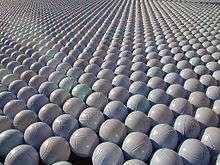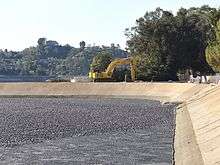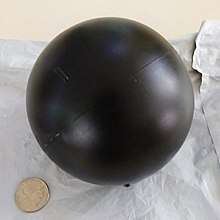Shade balls
Shade balls are small plastic spheres floated on top of a reservoir for environmental reasons, including to slow evaporation and prevent sunlight from causing reactions among chemical compounds present in the water. Also known as bird balls, they were developed initially to prevent birds from landing on bodies of water.

History
Shade balls were originally known as bird balls, as they were developed initially to prevent birds from landing on toxic tailing ponds produced by mining operations.[1]
They have also been used by airports to prevent birds from being attracted to nearby drainage ponds thus reducing collisions with planes.[2]
Usage by LADWP

Starting in mid-2009, the Los Angeles Department of Water and Power (LADWP) put about 400,000 balls in the Ivanhoe reservoir with the main objective of preventing the formation of a carcinogenic chemical, bromate, which forms when naturally occurring bromine reacts with chlorine in sunlight.[1][3] In the original release by the LADWP, there is no mention of water conservation as an objective and the project was planned for a five-year life span, until a Griffith Park project was completed. The reduction in evaporation led to an estimated savings of about 1.1 billion liters (290 million gallons) of water in one year.[1]
In 2014 and 2015, the LADWP put 96 million shade balls onto its largest reservoir (Las Virgenes)[4] in response to the United States Environmental Protection Agency's surface water treatment rule,[5] which requires large reservoirs of treated water to be covered.[6][7] The LADWP says that in addition to reducing evaporation, they also reduce UV radiation by-products and algae growth.[8] The balls saved 1.7 million cubic metres of water from evaporating during their deployment from August 2015 to March 2017. However, they required 2.9 million cubic metres of water in their manufacture. Nevertheless, the balls have a lifespan of ten years, and the plastic may be reused after that.[9]
Construction

The shade balls used in the Los Angeles project are made of high-density polyethylene (HDPE) with carbon black additive to protect the plastic from ultraviolet radiation.[10][11][12][13] Adding carbon black also prevents the formation of bromate, a suspected human carcinogen.[14][15]
They are about 4 inches (10 cm) in diameter, and are partially filled with water to avoid being blown by wind. HDPE plastic is commonly used for food and beverage containers as well as water distribution pipes.[10]
References
- Marco Chown Oved, "Shade Balls – Just Add Water", Toronto Star, October 23, 2016
- Los Angeles Unleashes 'Shade Balls' To Protect Reservoir Water Quality
- Vara-Orta, Francisco. "A reservoir goes undercover". articles.latimes.com. Los Angeles Times. Retrieved 27 December 2015.
- Poon, Linda (August 12, 2015). "How a Giant Ball Pit Is Saving L.A.'s Water Supply". CityLab.
- "Water: Long Term 2 Enhanced Surface Water Treatment Rule". United States Environmental Protection Agency. 2013-02-11. Retrieved 2015-08-13.
- "Los Angeles Unleashes 'Shade Balls' To Protect Reservoir Water Quality". National Public Radio. 2015-08-12. Retrieved 2015-08-13.
- Walton, Alice; Grad, Shelby (2015-08-12). "The 36-cent 'shade ball' that could save $250 million and keep L.A. water clean". The Los Angeles Times. Retrieved 2015-08-12.
Shade balls are used to protect water quality, prevent algae growth and slow evaporation from the city’s reservoirs.
- Walton, Alice (August 23, 2015). "L.A.'s shade balls go viral – but the Internet has mixed opinion". Los Angeles Times. Retrieved 24 August 2015.
- Starr, Michelle. "These Shade Balls Were Supposed to Save Water, But There's a Big Problem". ScienceAlert.
- "Shade Balls: Sustainable Drought Prevention", retrieved 3-31-2016, Precision Plastic Ball
- "Los Angeles Reservoir Covered With 96 Million Shade Balls to Conserve Water Amidst Drought" (Aug 12, 2015) ABC News
- "'Shade balls' protect LA water supply during drought" (13 Aug 2015) CNBC
- "LA Rolls Out Water-Saving 'Shade Balls'" (August 11, 2015) NPR
- "Potassium Bromate (Group 2B)". International Agency for Research on Cancer: Summaries and Evaluations. Canadian Centre for Occupational Health and Safety. Retrieved 2008-03-09.
- Kurokawa, Yuji; Maekawa, A; Takahashi, M; Hayashi, Y (July 1990). "Toxicity and carcinogenicity of potassium bromate – a new renal carcinogen". Environmental Health Perspectives. Environmental Health Perspectives. 87: 309–35. doi:10.1289/EHP.9087309. JSTOR 3431039. PMC 1567851. PMID 2269236.
External links
| Wikimedia Commons has media related to Shade balls. |